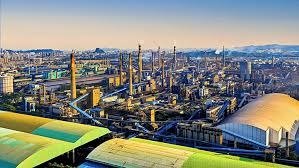Understanding Antiscalant Chemicals for Cooling Towers and RO Plants

Introduction
When it comes to industrial water treatment, antiscalant chemicals play a critical role in maintaining the efficiency and longevity of equipment such as cooling towers and reverse osmosis (RO) plants. These chemicals are essential for preventing scale buildup, which can severely affect performance and increase maintenance costs. In this blog, we will delve into how antiscalant chemicals work, their importance in cooling towers and RO plants, and how to choose the right one for your system.
What Are Antiscalant Chemicals ?
Antiscalant chemicals are specialized agents designed to prevent the formation of scale in water systems. Scale occurs when dissolved minerals like calcium carbonate, calcium sulfate, and silica precipitate out of water due to changes in temperature, pressure, or concentration. These deposits can clog pipes, reduce the efficiency of heat exchangers, and damage membranes in RO systems.
Antiscalant chemicals inhibit these minerals from crystallizing and adhering to surfaces by altering their structure and keeping them in solution. This prevents costly downtime and extends the operational life of the equipment.
Importance of Antiscalant Chemicals in Cooling Towers
Cooling towers are an integral part of many industrial processes, helping to regulate temperatures and dissipate excess heat. However, they are also prone to scaling due to the constant circulation of water, especially in regions with hard water. The buildup of scale in cooling towers can reduce heat transfer efficiency, leading to higher energy consumption and a shorter lifespan of equipment.

Using antiscalant chemicals in cooling towers ensures that the system remains free of deposits that could hinder its performance. These chemicals help maintain optimal water quality, prevent blockages in pipes, and minimize the need for frequent cleaning or maintenance. The right antiscalant chemicals can even allow cooling towers to operate with higher water recovery rates, reducing overall water consumption.
Antiscalant Chemicals in Reverse Osmosis (RO) Plants
Reverse osmosis (RO) plants are designed to purify water by passing it through a semipermeable membrane. One of the biggest challenges in RO plants is the formation of scale on the membrane surfaces, which can lead to decreased water flow, higher energy usage, and increased operational costs. This is where antiscalant chemicals come into play.
By dosing RO feed water with antiscalant chemicals, plant operators can prevent scale formation on membranes. These chemicals disrupt the crystal structure of scale-forming compounds, keeping them in a dissolved state and thus preventing fouling. This ensures that the RO membranes remain clean and operate at peak efficiency.
Additionally, antiscalant chemicals allow RO plants to operate at higher recoveries, meaning more water can be processed without the risk of scale buildup. This results in significant savings in both water and energy costs, making antiscalant chemicals a crucial investment for any RO plant.
Choosing the Right Antiscalant Chemicals
Selecting the right antiscalant chemicals for your cooling tower or RO plant depends on several factors, including water composition, system design, and operational conditions. Here are a few key considerations:
- Water Analysis: Conducting a detailed water analysis will help determine the specific scaling potential in your system, allowing you to choose antiscalant chemicals that target the most problematic minerals.
- Compatibility: Ensure that the antiscalant chemicals you choose are compatible with other chemicals in your water treatment program to avoid adverse reactions.
- Dosage: Proper dosing is essential for effective scale prevention. Overdosing can lead to chemical waste and operational issues, while underdosing may fail to provide adequate protection.
- Environmental Impact: Opt for antiscalant chemicals that are eco-friendly and meet regulatory standards for environmental safety.

Conclusion
Antiscalant chemicals are a vital part of maintaining the efficiency and longevity of both cooling towers and reverse osmosis (RO) plants. By preventing scale buildup, these chemicals save energy, reduce operational costs, and extend the life of your equipment. Whether you are dealing with a cooling tower or an RO plant, using the right antiscalant chemicals is a smart investment in the long-term performance of your system.
Make sure to consult with water treatment professionals to select the best antiscalant chemicals for your specific needs and ensure that your industrial systems run smoothly, with minimal downtime and maximum efficiency.
This blog emphasizes the importance of antiscalant chemicals and their numerous benefits, making it easier for readers to understand their critical role in industrial water treatment.
